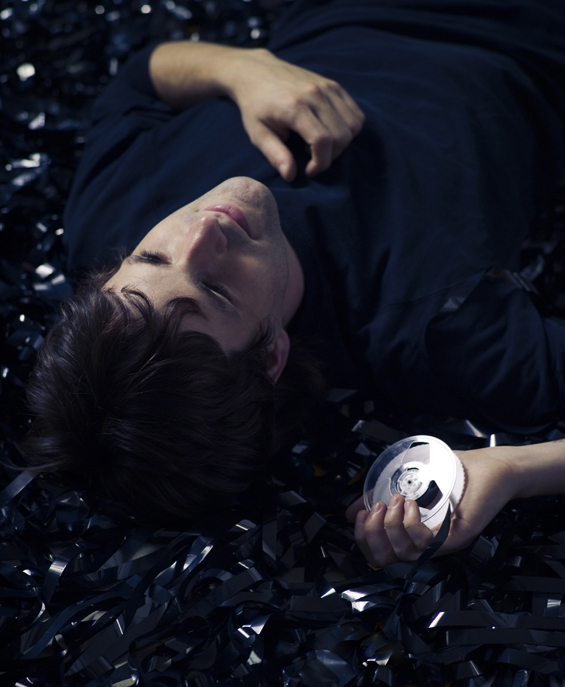

photos: Lars Borges
TEN QUESTIONS WITH DEADBEAT
We've been big fans of Scott Monteith's Deadbeat project since its inception (one of the first textura interviews was this one done with Scott in June 2004) and generally feel the body of work he's issued, while admired and acclaimed, has been a tad underappreciated. Operating out of his Montreal home base, Monteith developed a unique style that drew deeply from dub and techno traditions without simply aping existing styles associated with those genres. In crafting dramatic long-form travelogues on Wild Life Documentaries, Something Borrowed, Something Blue, and New World Observer, Monteith proved he had something considerably more ambitious in mind than mere imitation. After faltering somewhat with the less stellar Journeyman's Annual, Monteith's back with what might be his most satisfying collection to date, Roots and Wire, on which the now-Berlin-based producer is joined by Paul St Hillaire on two cuts. The vet of multiple MUTEKs and assorted other festivals (Sonar, Transmediale) sounds newly energized and at the top of his game on a concise eight-track album that's sure to appeal to Echospace and Rhythm & Sound devotees. In late August, Monteith generously took himself away from his production duties to update us on all things Deadbeat.
1. With you having been such a signature presence on the label for so many years, Deadbeat over time became rather synonymous with ~scape. What prompted the move to Wagon Repair and how does it feel to no longer have that identification with ~scape?
A good friend of my father's once told me that changing your job every five years was a sure-fire way to ensure you're being met with new challenges and learning new skills, and the move to Wagon Repair feels a little like that. I still have a good relationship with Barbara (Preisinger) and Stefan (Betke) and expect I'll probably work with them again in the future, but it felt important creatively for me to branch out a bit for this album. Mathew recently relocated to Berlin as well so the decision to do it with Wagon Repair came about quite naturally. They did a great job with the first two 12-inches and their excitement about the music generally gave me a renewed sense of creative purpose.
2. Likewise, you were such an integral part of the Montreal musical community, I was surprised to learn you'd made the move to Berlin , despite it being a natural destination for its fertile music scene. What prompted the relocation, and has being part of the community there had any impact on your music-making? Are you in close, daily contact with Mike Shannon, Robert Henke, and others?
It's been a very positive move for a lot reasons, not the least of which is the increase in gigs due to the considerably lower traveling expenses associated with touring. The fact that you can go out and hear good forward thinking music basically twenty-four hours a day, seven days a week here is also inspiring. It really reaffirmed the importance of community for me. I loved living in Montreal but the lack of consistent weekly events often left me feeling kind of isolated. I share a studio with Mike so I see him pretty much everyday, Colin (the Mole) and Mathew quite regularly as well. Robert I don't see as much as I'd like to. Generally I think just being surrounded by so much good music and talented musicians and DJs has had a very positive effect on my music-making and life in general.
3. In the notes accompanying Roots and Wire, you thank the “promoters who have seen fit to roll the dice during a decidedly difficult year.” What specifically made the year so “decidedly difficult”?
I split up with my wife and unfortunately fell into the horribly clichéd trap of trying to drown my sorrows in booze. It took me a long time to get it together and start to deal with some of the emotions associated with the breakup and just deal with life in general.
4. Having Paul St Hillaire sing on two of the new album's songs can't help but bring your sound closer to the Rhythm & Sound aesthetic. The two of you sound like such natural partners, the two of you should head out on tour together. Can you tell us a bit about how the collaboration came about and how you recorded the two tracks with him (e.g., were they recorded live or were pieces recorded separately and later assembled)?
I'd spoken to Paul about doing tracks together quite a few years ago, but I've always felt these kinds of collaborations work best when they're allowed to unfold at their own pace. We played a few shows together over the last year at different festivals and always talked about doing some tunes. When I started to work on the album, I had this in mind and passed off the bare drum and bass tracks to Tiki to see what he would come up with. I wrote all of the synths and additional instrumentation after the vocals so that they were really allowed to guide the melodic direction the tracks would take. It was a very fun and inspiring process.
5. The spacious sound you create on “Rise Again” is really amazing, and the production throughout is incredibly multi-dimensional. Can you talk a bit about your approach to production for the album, given that it's such a key dimension of the recording and invests the material with so much presence?
I had a bit of a revelation while recording the album about the act of recording itself. While I've always been and continue to be computer-centric, recording has always been an important aspect of sound design for me, be it for background ambiance or more obvious sounds like percussion. I was reading an article I stumbled across on the net called “Shitty is Pretty: Anatomy Of A Funk 45” by Gabriel Roth. It's a fantastic read and hyper-inspiring for many reasons, but as I read about all of these techniques for micing drums and other instruments, it occurred to me that I could just as easily mic my virtual instruments and samplers, re-record them through the board and suddenly there would be this unifying ambiance to everything, like the music was actually recorded by a bunch of guys standing around in the same room playing real instruments. It was very exciting and I'm supremely looking forward to exploring this more.

6. There are a few moments on the new album (e.g., “Xberg Ghosts”) where there also seems to be an echo of that Deepchord-Soultek-Echospace style. Has their material exerted an influence on your latest output and, if so, in what way?
Obviously I think it's fantastic that there is this renewed interest generally in dub techno/house/step what have you. I try not to listen to anything that feels too close to home stylistically when working on an album and have only listened to The Coldest Season for the first few times in the last couple of weeks. I thinkit's a great album, super heavy. I always had the sense with the Deepchord records that they were almost too derivative of the Basic Channel/Maurizio sound, which I love as much as anybody, but there seem to be a freshness somehow with the Echospace project, perhaps it's Stephen's influence... I don't know, it's a great record anyway.
7. Though the new release largely dispenses with the overarching narrative structures that underpinned the ~scape albums Wild Life Documentaries, Something Borrowed, Something Blue, and New World Observer, Roots and Wire hardly suffers for being less narratively oriented. I'm wondering if downplaying that conceptual dimension proved to be liberating, given that it would have enabled you to simply focus on making each track something perfect unto itself rather than worrying about how it might fit into a larger whole?
The only grand concept that made it through the whole recording process for this album is that I wanted it to fit on two records without sacrificing the sound. Perhaps it's having access to more record shops here but they have become really important objects in my life again. It also presents a nice length for an album I think, just shy of an hour.
8. The promo text accompanying Roots and Wire notes your frustration over the recent renewed interest in dub limiting itself to “minor key, sad, dark shit.” Could you elaborate on what exactly you're referring to?
That was a comment made specifically regarding the song “Babylon Correction” and not intended to be any sort of serious criticism, it was just a flippant remark. I'm the king of sad dark shit, but I also really enjoy the more uplifting dubs from the late ‘70s and that song was an attempt to capture some of that spirit. I think there is a risk of sucking the fun out of music if it all melodically centers around minor keys and one note bass lines, however. That kind of happened with drum and bass in the late ‘90s almost over night. All of a sudden all the DJs seemed to be playing this snarling dark techstep, and as a result the parties became a bunch of guys in baseball hats standing around not dancing waiting for the next bass drop, calling for rewinds, and wondering what happened to all the girls that used to come out—a whole lot of no fun at all.
9. After eight years of releases, you've built up an extensive discography so I'm curious about your own perspective on it. Though I love the progressive growth and refinement I hear in the move from Wild Life Documentaries to Something Borrowed, Something Blue and then New World Observer, Roots and Wire sounds to me like it might be your most perfectly-realized recording to date. The exceptionally high level is maintained from start to finish and though there's broad stylistic terrain covered it ends up feeling like a unified collection. What would be your take on your music's development through the album releases from Wild Life Documentaries to Roots and Wire?
It's difficult for me to look at critically I think but I definitely have a sense that I'm getting more and more comfortable with giving the individual sounds the space they deserve and allowing things to unfold more gradually. The power of repetition has become a really important creative force for me again lately. I always struggle a lot with melodies and I think I tended to try and hide this behind a lot of micro-editing with the earlier work, where as now I'm much more concerned with just letting grooves unfold and exploring more timbral changes as a opposed to rhythmic ones. Spiritually I guess it's starting to feel much more like honing a craft than simply tinkering with machines and hoping for the best.
10. What's coming up in the future? Are you still involved in Crackhaus? Still working with Henke on Atlantic Waves? Fill us in on what's ahead for you.
There will definitely be some new Crackhaus material at some point again. Atlantic Waves is on ice for the time being but I would love to be involved with it again. I've had the idea for a series for some time that I may explore in the new year, for now just a lot of touring and trying to develop the live set into something really exciting again.
November 2008![]()